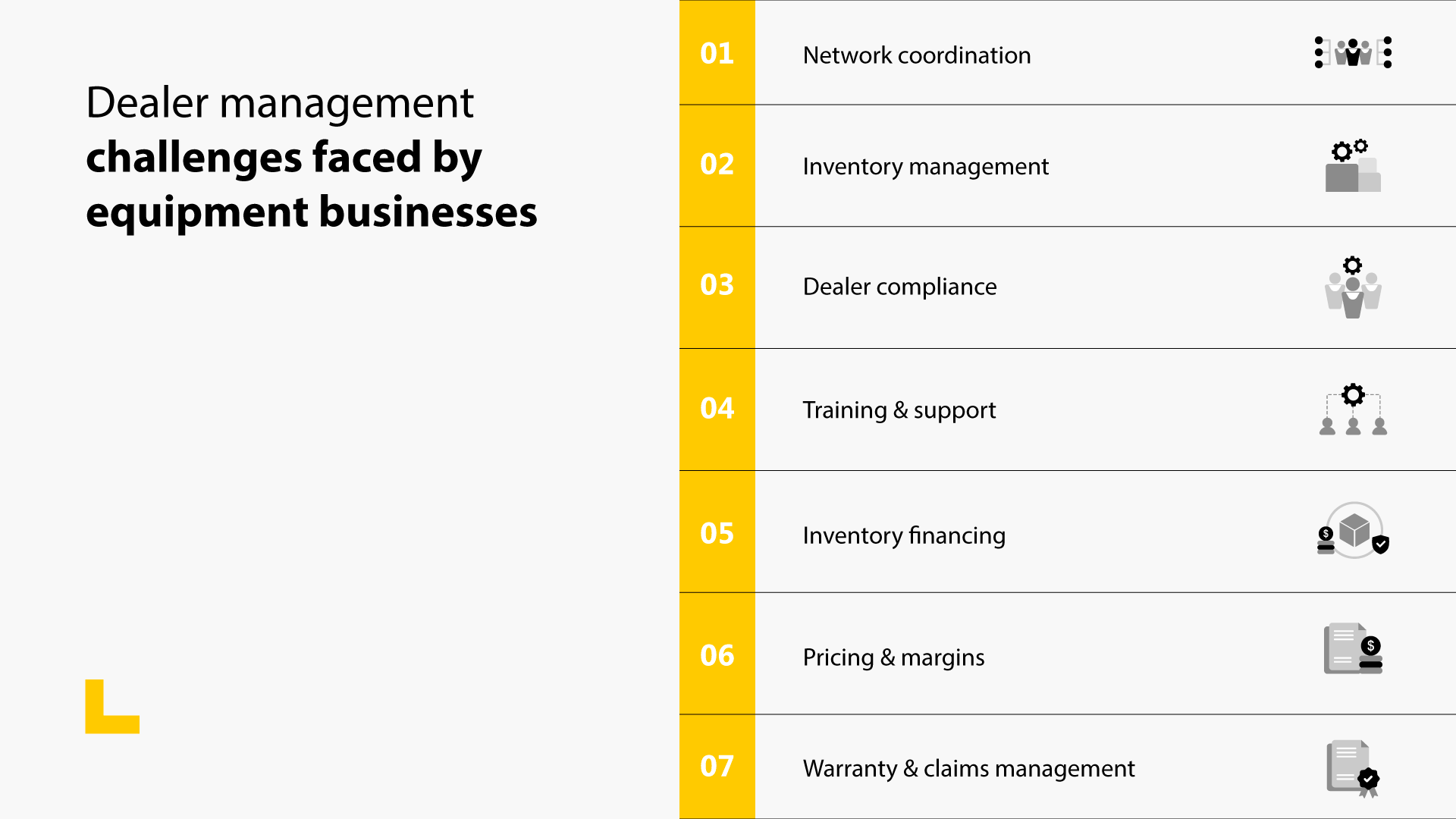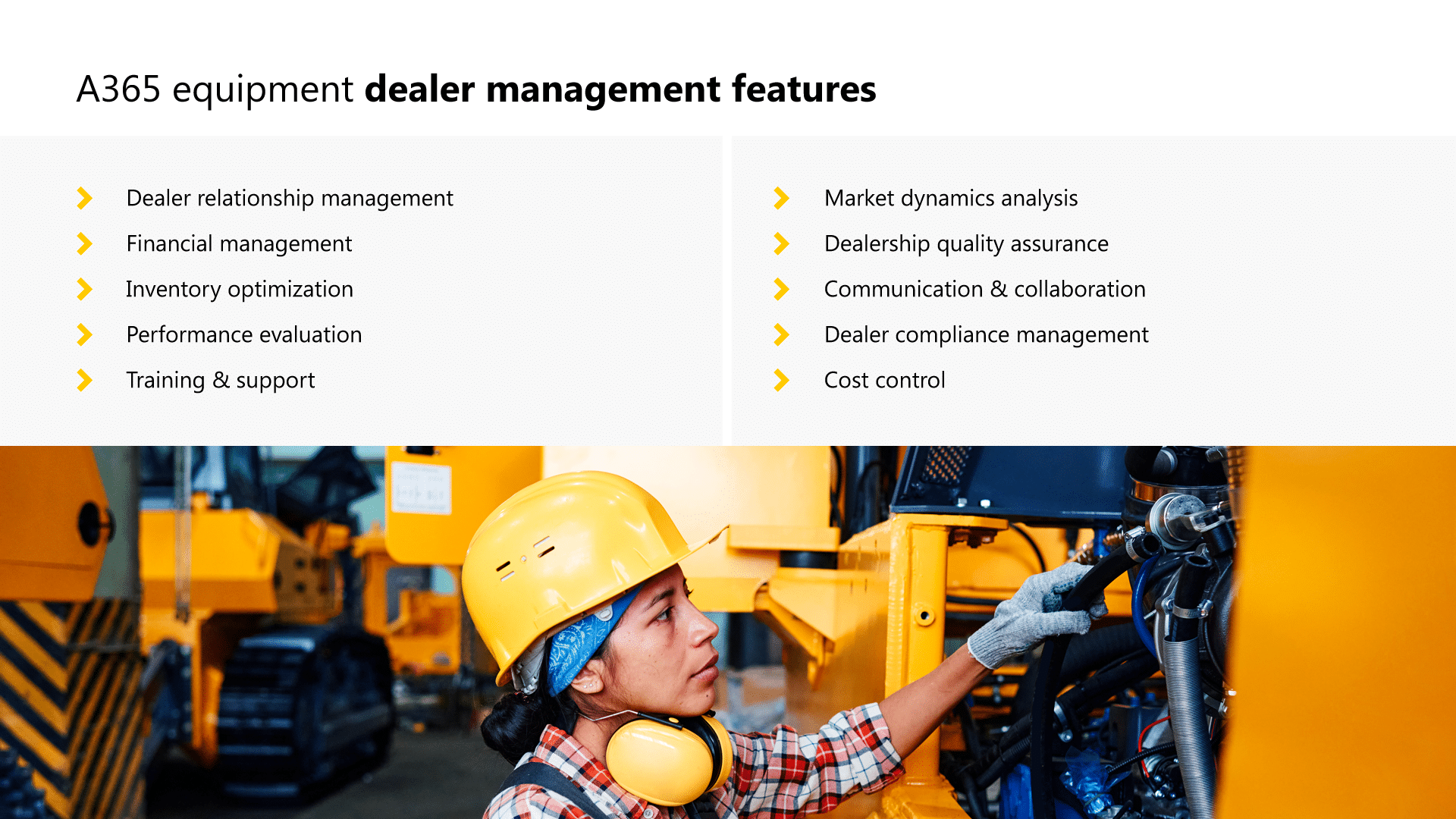Successful dealer relationships are the linchpin of operations for equipment businesses. Ensuring that your dealers are aligned with your business objectives and standards is vital for maintaining high service standards and operational efficiency.
However, managing a network of dealers comes with its unique set of challenges, from coordinating operations to handling warranties and claims.
7 dealer management challenges faced by equipment businesses

- Network coordination
Challenge: Coordinating a network of equipment dealers can be like orchestrating a complex symphony. Ensuring that dealers are in sync with your business objectives and standards is pivotal for a fruitful partnership. Misalignment can lead to operational inefficiencies and a fragmented dealer network.
Example: Consider an equipment manufacturer with an expansive dealer network spanning various regions. Each of these regions presents distinct challenges with unique customer preferences, local regulations, and market characteristics.
Coordinating these dealers to align with the promotion of appropriate equipment, compliance with pricing strategies, and the delivery of consistent service can be a complex endeavor. Any misalignment in these efforts could result in inconsistent customer experiences and perceptions of the brand.
2. Inventory management
Challenge: Striking the right balance in equipment inventory management is a perpetual challenge. Overstocking can lead to high storage costs, while understocking can result in missed sales opportunities, impacting efficiency and financial performance.
Example: Imagine a construction equipment manufacturer. Overstocking crucial parts and equipment ties up significant capital and results in storage expenses. On the flip side, understocking essential components could lead to delays in fulfilling orders, which can frustrate both customers and dealers. Finding the equilibrium to ensure the right equipment is available without an excessive surplus is paramount.
3. Dealer compliance
Challenge: Ensuring compliance with industry regulations and dealer agreements is not merely a best practice; it’s a necessity for maintaining a seamless relationship and preventing potential legal entanglements.
Example: Mining equipment manufacturer adherence to safety and environmental regulations is of utmost importance. Failing to guarantee that dealers comply with these regulations can lead to legal penalties, damage the company’s reputation, and even result in discontinued partnerships or worse, injuries and even death. Manufacturers must regularly audit dealers and guide them to ensure compliance.
4. Training & support
Challenge: Furnishing dealers with the requisite training and support is the cornerstone of their success. Well-trained dealers can effectively represent your equipment, significantly impacting the overall customer experience.
Example: For a manufacturer of agricultural machinery, it’s crucial to ensure that dealers have an in-depth understanding of equipment operation and maintenance. Inadequate training can lead to dealers providing incorrect advice to customers, improper equipment use, and an increased likelihood of breakdowns. To avoid these issues, the manufacturer should offer comprehensive training programs to equip dealers to provide valuable support to customers.
- Inventory financing
Challenge: Managing the financing of equipment inventory is a multifaceted task. It involves securing capital to purchase, maintain, and store the inventory while ensuring the availability of equipment to meet demand.
Example: Imagine an equipment distributor who needs to maintain a substantial inventory of bulldozers, excavators, and cranes. This requires significant capital investment not only to purchase the equipment but also to cover storage costs and any necessary maintenance. Managing these financial aspects while keeping the inventory adequately stocked is an ongoing challenge.
6. Pricing & margins:
Challenge: Determining the optimal pricing strategy and profit margins for equipment is a complex endeavor. It requires striking a balance between maximizing profitability and remaining competitive in the market.
Example: A manufacturer specializing in construction machinery faces the challenge of setting the right price point for their products. Overpricing could lead potential customers to opt for competitors’ equipment, potentially resulting in lost sales. Conversely, underpricing may erode profitability. Achieving the right balance entails conducting in-depth market analysis, benchmarking against competitors, and taking economic factors into consideration to determine the ideal pricing strategy for each product in its equipment portfolio.
7. Warranty & claims management
Challenge: Managing warranties and claims for equipment is a resource-intensive task but is indispensable for ensuring customer satisfaction and preserving the company’s reputation.
Example: Consider an earthmoving equipment manufacturer that provides a warranty for their equipment. When a customer experiences a defect within the warranty period, the manufacturer must efficiently handle the claim, provide necessary repairs or replacements, and ensure the customer’s contentment. Mishandling claims, delays, or failing to honor warranties can result in disgruntled customers, negative reviews, and a damaged reputation.
Seamless equipment dealer management with A365
In response to these challenges, A365 steps in as a comprehensive solution to transform dealer management processes of equipment businesses. A365’s dealer management features are a game-changer, addressing hurdles head-on and optimizing dealer operations from inception to completion.
A365’s dealer management feature is an all-encompassing tool designed to optimize every facet of the dealer relationship. It provides comprehensive support, simplifying dealer interactions, and ensuring compliance with industry standards. A365 fosters efficient communication between your management teams and your dealer network, streamlining collaboration, and ensuring that dealer operations run smoothly.
A365 equipment dealer management features
Dealer operations benefit from enhanced warranty management and maintenance processes, adding value to every facet of your dealer network and delivering exceptional aftersales experiences. A365 ensures that dealer processes are meticulously designed for peak operational efficiency, minimizing downtime, and ensuring that dealers have access to the support and services they need when required.
A365’s dealer management features offer a comprehensive solution to address challenges and enrich the dealer relationship through:

- Dealer relationship management: A365 acts as a communication bridge between your management teams and your dealer network. It streamlines collaboration and ensures that dealer operations run smoothly. The result is a cohesive and aligned network.
- Financial management: Managing costs and finances is at the core of efficient dealer operations. A365’s financial management tools empower you to optimize your budget and allocate resources effectively. This ensures that you can support your dealers without straining your bottom line.
- Inventory optimization: A365 helps maintain the right inventory levels by providing insights into demand and inventory data. This minimizes downtime and ensures that dealers have timely access to products, improving their overall efficiency.
- Performance evaluation: A365 enables you to assess the performance of your dealers accurately. You can establish clear performance metrics, allowing you to identify areas for improvement and recognize top-performing partners. Data-driven evaluations enhance your ability to reward and support dealers based on their actual performance.
- Training & support: Effective training and support resources are integral to successful dealer relationships. A365 offers comprehensive training materials, equipping your dealers with the knowledge and tools to represent your products effectively, ultimately enhancing the customer experience.
- Market dynamics analysis: Staying competitive requires a deep understanding of market trends and dynamics. A365 helps you gather and analyze market data, providing insights into pricing strategies and margin optimization, enabling you to make informed decisions.
- Dealership quality assurance: Consistency in brand representation is paramount. A365 helps maintain high-quality standards across your dealer network by providing guidelines, best practices, and quality assurance protocols. This ensures that your products and services are consistently delivered to customers.
- Communication & collaboration: Effective communication and collaboration are pivotal for building strong dealer relationships. A365 offers tools to enhance the flow of information and cooperation between your teams and dealers, fostering a sense of partnership, transparency, and mutual understanding.
- Dealer compliance management: A365 simplifies the management of compliance with industry regulations and dealer agreements. It centralizes documentation, automates compliance checks, and alerts you to potential issues, minimizing the risk of legal challenges.
- Cost control: A365 emphasizes operational efficiency, which, in turn, helps control costs by optimizing various processes. Streamlining inventory management and automating warranty and claims processes minimizes wastage and maximizes profitability.
Our dealer management functionalities embedded in A365 seamlessly integrate with other Microsoft technologies, such as Microsoft Azure for cloud services and Microsoft Power Platform for data analytics and workflow automation. This enables the full leveraging of the Microsoft ecosystem, ensuring a comprehensive and cohesive solution for your dealer operations.
A365 harnesses the transformative power of AI within Microsoft Dynamics 365 to redefine dealer management. Through AI-driven insights and personalized interactions, A365 fine-tunes dealer management processes, identifies efficiencies, and streamlines workflows, resulting in heightened performance and operational excellence.
The predictive intelligence of AI equips your dealer management with confidence and foresight. By analyzing data and user patterns, AI-driven dealer forecasting becomes the cornerstone of your dealer network’s success. This predictive capability empowers your business to excel in dealer operations, enabling informed decisions and the efficient orchestration of dealer workflows.
In the fiercely competitive landscape of equipment businesses, effective dealer management is a strategic advantage. A365’s dealer management feature offers a holistic solution to tackle the multifaceted challenges encountered in this domain.
By streamlining operations, enhancing communication, ensuring compliance, and optimizing financial management, A365 strengthens dealer relationships, drives operational excellence, and enriches the overall dealer network.
It’s a tool that not only benefits your business but also delivers exceptional after-sales experiences to your customers. With A365, you can overcome the complexities of dealer management and elevate your equipment business to new heights.
Want to elevate your equipment dealer management game? Connect with us today!








